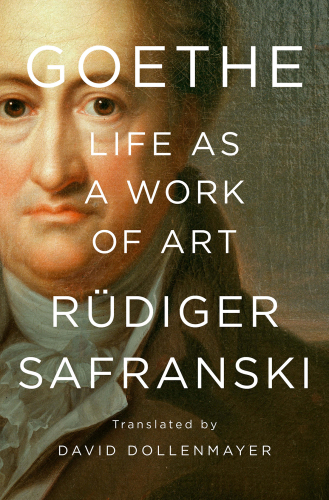
Goethe
Life as a Work of Art
کتاب های مرتبط
- اطلاعات
- نقد و بررسی
- دیدگاه کاربران
نقد و بررسی

Starred review from February 6, 2017
Renowned biographer Safranski (Romanticism: A German Affair) offers a learned and arguably definitive account of Johann Wolfgang von Goethe (1749–1832). His life of the celebrated author and statesman abounds with stormy love affairs and illustrious friendships, but Safranski minimizes court gossip and personal foibles to focus on Goethe’s ideas and thoughts. Goethe was a charismatic polymath who weathered several life-threatening illnesses, and was a leading figure in Weimar politics; Safranski calls him a “bureaucratic draft horse and a poetic Pegasus.” After his immensely successful first novel, The Sorrows of Young Werther, was published when he was 25, Goethe dominated Europe’s literary culture. His early triumph stoked in him a lifelong sense of his own genius. Goethe intersected with his era’s leading figures, including Mozart, Voltaire, Schiller, and the brash, brilliant Schopenhauer, the student who would be master. After a life-changing journey to Italy, Goethe embraced classical ideals of order that he never abandoned. His interest in the natural sciences and pull toward pantheism, meanwhile, led him to be skeptical of monotheism. His “life as a work of art” culminated in the play Faust, the ultimate tale of worldly ambition. Safranski’s lyrical style, many speculative passages, and abundant details will daunt some casual readers. Scholars will welcome this intellectual biography, richly embellished by primary sources and aided by the strong Dollenmayer translation.

Starred review from March 1, 2017
A masterful life of the prolific playwright, novelist, statesman, and poet who defined German romanticism.After the production of his play Gotz, 24-year-old Johann Wolfgang von Goethe (1749-1832) soared to fame throughout Germany, "a new star in the literary firmament," a genius acclaimed for his "earthy, powerfully visceral tone" and "liberation from the conventional rules." The following year, he wrote The Sorrows of Young Werther in a three-month burst of creative energy, drawing on the "stormy" romantic turmoil in his own life. Safranski, biographer of Friedrich Schiller, Arthur Schopenhauer, and Friedrich Nietzsche, among others, brings sensitivity and authority to a sweeping chronicle of Goethe's life, drawing liberally from the writer's autobiography and correspondence as well as other contemporary sources. The author has made the unusual decision to incorporate Goethe's own words in italics rather than introducing quotations, resulting in a seamless, flowing narrative that foregrounds Goethe's perspective while still offering a rich historical, philosophical, and artistic context. In a preface, conclusion, and two brief essays that punctuate the biography, Safranski pauses for reflection on Goethe's work, relationships, state of mind, and intellectual interests, which included mysticism, alchemy, nature, and the existence of God. The young Goethe was influenced by Johann Gottfried Herder, already a famous writer although only five years older than his new friend. Goethe's "candor, eagerness to learn, self-confidence, unself-consciousness, inventiveness, and playful and carefree nature" charmed Herder; for his part, Goethe was enchanted with the iconoclastic thinker whom Safranski likens to "a German Rousseau." Later influences included Spinoza, Wilhelm von Humboldt, Byron, the Sturm und Drang writers who passed through Weimar, and Schiller, with whom he collaborated on plays. Prominent are his many passionate love affairs, often with married women, that fueled his work. Safranski places his sister among those women, noting "an erotic edge to their relationship." Throughout, the author ably elucidates Goethe's works, emphasizing the significance of Faust as a herald of modernism. A penetrating, engrossing biography of a literary giant.
COPYRIGHT(2017) Kirkus Reviews, ALL RIGHTS RESERVED.

Starred review from March 15, 2017
Johann Wolfgang von Goethe (1749-1832) was not only Germany's most celebrated poet, dramatist, critic, novelist, and playwright but also a statesman, scholar, and naturalist. His rich career and life spanned a period of drastic changes in German and European history. In this monumental book, German philosopher and biographer Safranski (Martin Heidegger) sets Goethe's wide-ranging work in the context of the historical, literary, and political movements of the late 18th and early 19th centuries, giving accounts of his relationships with the leading figures of the day, his influence on contemporary culture, and his personal reflections on historical events across Europe. Each chapter reflects a major station in Goethe's intellectual achievements. In a highly readable translation, which incorporates original translations from Goethe's work rather than relying on previous interpretations, Dollenmayer succeeds in giving these writings a unified, flowing voice. One of the greatest obstacles between Goethe and his American readership has quite often been his style. This biography affords readers easier access to a broad spectrum of his work and is a welcome contribution to Goethe scholarship. VERDICT Highly recommended for all literature collections. [See Prepub Alert, 10/17/16.]--Ali Houissa, Cornell Univ., Ithaca, NY
Copyright 2017 Library Journal, LLC Used with permission.

























دیدگاه کاربران